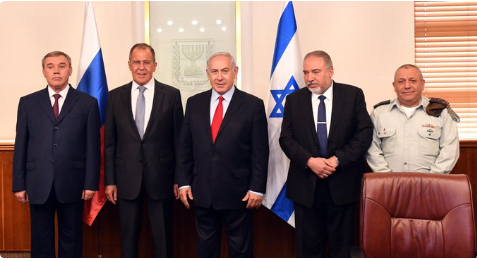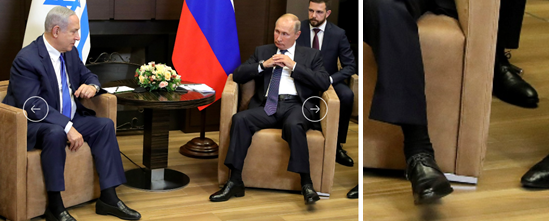This time there was a sharp debate between Putin and the Stavka. Putin insisted on receiving the Israeli; the Stavka settled on a compromise – Putin would meet Netanyahu after Shoigu had delivered the Stavka message. General Valery Gerasimov, Chief of the General Staff, did not attend this time.
Shoigu and Lavrov, whose ministry photograph shows him in the open air in Sochi (shoes not shown), know perfectly well the Israelis do not “fully agree with us”. That’s an irony directed at Putin for announcing “we have absolutely identical positions.”
Pentru mine a fost clar că e ceva cu Putin de când l-a reconfirmat pe Medvedev ca premier, recent. După ce mimase că ar pregăti epurarea echipei globaliste - aproape - pe - faţă a lui Medvedev. Îndoieli au mai avut şi Strelkov, şi Dughin, şi alţii. Medvedev a fost numit trădător (un diplomat rus în funcţie, ambasadorul rus în Libia, 2011, şi Evgheni Primakov). La Kremlin este un dualism de putere dar care prea mult nu mai poate continua.
Se pare că "incidentele critice evitate" dintre Rusia şi Israel ar fi de fapt ficţiune, care să-l arate pe Putin combativ faţă de Israel/Bibi, însă apare c-ar fi exact pe dos (dar nu şi-n cazul generalilor!).
Dances with Bears:
PUTIN ENDORSES NETANYAHU FOR RE-ELECTION – SHOIGU AND LAVROV REACT
By John Helmer, Moscow

On Friday afternoon in Sochi, President Vladimir Putin kept Israeli Prime Minister Benjamin Netanyahu waiting for three hours, and then publicly endorsed him for re-election. Putin’s endorsement was unconditional: he could have warned against Netanyahu’s election pledge, revealed last week, to annex the West Bank of Palestine, but he didn’t. Putin could have warned against Israeli air force and missile strikes on targets in Syria, but he didn’t. “We have absolutely identical positions,” Putin declared, according to the official Kremlin record. Putin was speaking only for himself.
That was made plain to Netanyahu during the Sochi session by the Russian Defense Minister, Sergei Shoigu, and Foreign Minister Sergei Lavrov. The Kremlin publication, however, cut them out of the photographic record and official communiqué, as if they weren’t there at all.
The Israeli press reported the three-hour delay to Putin’s arrival. In the interval, Putin acknowledged in his open remarks to Netanyahu, “you have just had a fairly detailed discussion with the top executives of the Defence Ministry and with Russia’s Defence Minister. We will now discuss everything that concerns this area.
A Jerusalem Post translation of an Arabic media report has claimed that “Moscow has prevented three Israeli air strikes on three Syrian outposts recently, and even threatened that any jets attempting such a thing would be shot down, either by Russian jets or by the S-400 anti-aircraft missiles…a similar situation has happened twice – and that during August, Moscow stopped an air strike on a Syrian outpost in Qasioun, where a S-300 missile battery is placed. Moreover, it was claimed that another air strike was planned for a week later on a Syrian outpost in the Qunaitra area and a third one on a sensitive area in Latakia. This development is what pushed Netanyahu to have his quick visit in Russia to try and convince Putin to ignore Israel’s attacks in Syria.”
Netanyahu’s version of what he said in Sochi, according to an Israeli government publication, was that “the first issue is security, and this is maintaining freedom of action for the IDF, including the air force, in the face of Iran’s attempts to militarily entrench in our region against us. We are operating constantly, and it is important to prevent unnecessary collisions. This is what we are doing in meetings such as these and also, of course, in the many telephone conversations between them.”
So what did Shoigu and Putin tell Netanyahu about Israeli Defence Force (IDF) “freedom of action”? According to the Kremlin record, nothing.
Instead, the Kremlin record concluded with this statement by Netanyahu: “I appreciate your [Putin’s] words that you respect the security of the State of Israel. This fact is revealed in all of our meetings, and I saw this again at our meeting with Defence Minister Sergei Shoigu. Coordination between our militaries is always very important. It is always important, but especially important now, because in the past month we have seen a sharp increase in Iran’s attempts to use the territory of Syria to attack us and to deploy missiles that threaten us. We are not prepared to simply take this threat, and so we have to act. In this situation, our dialogue is even more important. And I believe that we will discuss this at our meeting as well.”
Putin did answer, but the Kremlin has not reported it.
In the Arabic report, it is claimed “Putin let Netanyahu know that his country will not allow any damage to be done to the Syrian regime’s army, or any of the weapons being given to it, because giving such a permission would be seen as giving Israel leniency – something that contradicts Russia’s goal of assisting the Syrian regime.” The Arabic media source, and its Russian source, are in fact a Russian information operation, run by Alexander Lebedev’s Independent newspaper in London working in combination with the Saudi Research and Marketing Group (SRMG), publisher of Arab News. They announced a partnership to start a publication called Independent Arabia in January.
Netanyahu’s flying visit to Sochi was an election stunt, according to most Israeli press reports. Had Putin wanted to send Netanyahu a clear message that he endorses the warnings against IDF attacks in Syria from the Russian General Staff, he would have refused the meeting. This has happened before, at the insistence of the General Staff and Shoigu; for more details, click here and here.
This time there was a sharp debate between Putin and the Stavka. Putin insisted on receiving the Israeli; the Stavka settled on a compromise – Putin would meet Netanyahu after Shoigu had delivered the Stavka message. General Valery Gerasimov, Chief of the General Staff, did not attend this time. Gerasimov accompanied by Lavrov met Netanyahu, his defence minister and general staff chief, in Jerusalem on July 23, 2018.
 Extreme left: Gerasimov in his first visit to Israel, July 23, 2018. Unusually, he was not in uniform, although his IDF counterpart, Gen. Gadi Eisenkot, was in uniform. On his right: Israeli defence minister Avigdor Lieberman. Source: https://www.timesofisrael.com
Extreme left: Gerasimov in his first visit to Israel, July 23, 2018. Unusually, he was not in uniform, although his IDF counterpart, Gen. Gadi Eisenkot, was in uniform. On his right: Israeli defence minister Avigdor Lieberman. Source: https://www.timesofisrael.com
The Kremlin communiqué reports this endorsement by Putin of Netanyahu’s re-election: “Mr Prime Minister, I know that your country is on the eve of major domestic political events, the elections to Knesset on September 17, I believe. It is common knowledge that over 1.5 million former Soviet citizens live in Israel. We have always considered them our people, our compatriots. Naturally, we are not indifferent as regards future Israeli MPs, let me be straight about this. We are hoping they will be responsible politicians that will certainly maintain all recent achievements in bilateral relations and will move forward with us in developing Russian-Israeli ties.” This was Putin’s personal opinion.
It was not shared by the Russian officials sitting at Putin’s left during the meeting. The Kremlin has taken care to erase them – but not carefully enough. Look at the base line of the Kremlin photograph: revealed on the extreme right are three shoes: the first is on Putin’s left foot; in the centre, behind, is the Russian interpreter’s shoe; at right, there is the tip of the right shoe of a man sitting in the Russian first row. This belongs either to Defence Minister Shoigu or to Foreign Minister Lavrov.
 That Kremlin photographic record shows (image-1, left to right): Benjamin Netanyahu, Vladimir Putin, unidentified Russian staff man. Image-2: Putin, left shoe; Russian staffman, left shoe; right shoe of senior Russian minister, unidentified.
That Kremlin photographic record shows (image-1, left to right): Benjamin Netanyahu, Vladimir Putin, unidentified Russian staff man. Image-2: Putin, left shoe; Russian staffman, left shoe; right shoe of senior Russian minister, unidentified.
That shoe dropped when the Foreign Ministry issued a statement from Lavrov. The timing was almost four hours after the Kremlin release:
“We put a special emphasis on the need – and in this regard, the Israelis fully agree with us – to respect Syria’s sovereignty and territorial integrity in actual practice rather than only in word. In this sense, we upped the ante by urging assistance to the Syrian authorities and the Syrians at large in returning to peaceful life. It was stressed that the sanctions, which the US and the European countries had introduced against the legitimate government of Syria, were wholly counterproductive.”
Shoigu and Lavrov, whose ministry photograph shows him in the open air in Sochi (shoes not shown), know perfectly well the Israelis do not “fully agree with us”. That’s an irony directed at Putin for announcing “we have absolutely identical positions.”
by Editor - Sunday, September 15th, 2019





























5 comentarii :
Vrabia malai viseaza !!!
Putin a redat rusilor mindria de a fi rusi,cetateni ai marii Rusii !!!
Cine il va da jos impotriva vointei rusilor ?
Cine, Riddick ???
Americanii, cumva ?
Americanii l-au pus pe Eltin in scaun , creind ca kle va fi sluga, iar Eltin a dat puterea lui Putin !!!
Rusia ramine Rusia, tara celor 11 fuse orare, adica tara in care soarele aproape nu apune !!!
Articolul nu-i tradus, aşa că poate nu oricine înţelege sensul lui.
Iar sensul este că Putin cam a început să dea înapoi, să facă concesii neprietenilor, iar generalii atrag atenţia asupra acestui fapt.
Nu de un Putin "moale" ar fi nevoie.
Există semnele unei înțelegeri ruso-occidentale. Să ne amintim și Moldova. Ar fi bine dacă ar fi așa, căci orice pace e mai bună decât un război. N-o să piară lumea pentru niște ayatollahi demenți. Păcat de poporul iranian și de cel sirian.
Rămâne de văzut locul nostru în acest eventual "deal". Trebuie urmărite discuțiile privind Deveselu, alea or să fie indiciul cel mai clar pe ce parte vom pica. Eu aș paria pe Vest, probabil rușii se vor mulțumi cu o parte din Ucraina.
Până la urmă, poate Trump va confirma speranțele puse în el și bunele relații pe care părea a le avea cu Putin.
Jirinovski zice că "Turcia se va alia cu Rusia", iar asta SIGUR ar însemna cel puţin că americanii vor vrea să aducă în România ("şi Bulgaria") armament nuclear:
"- Yes. So, it's not only about leaving NATO. It's also about the use of Turkey's best airbases. Now, it's Incirlik with NATO and American aircraft and instructors. But Turkey can abrogate the agreement. We'll get the most powerful airbase in the Middle East. Perhaps a naval base and a ground base. So, we can develop very powerful defense cooperation. Erdogan is interested in this, he wants to produce the S-400 or the S-500. We'll supply tanks and aircraft.
He's ready to recognize the ruble. The ruble could be in Turkish circulation as well as the lira."
https://halturnerradioshow.com/index.php/en/news-page/world/top-russian-politician-says-erdogan-told-him-turkey-will-leave-nato-ally-with-russia
Nu va fi uşoară "bascularea" Turciei, iar Erdogan cică ar fi membru sau simpatizant al Frăţiei Musulmane, care de fapt este masoneria islamică, deci... nu prea s-ar potrivi "profeţia".
Trimiteți un comentariu